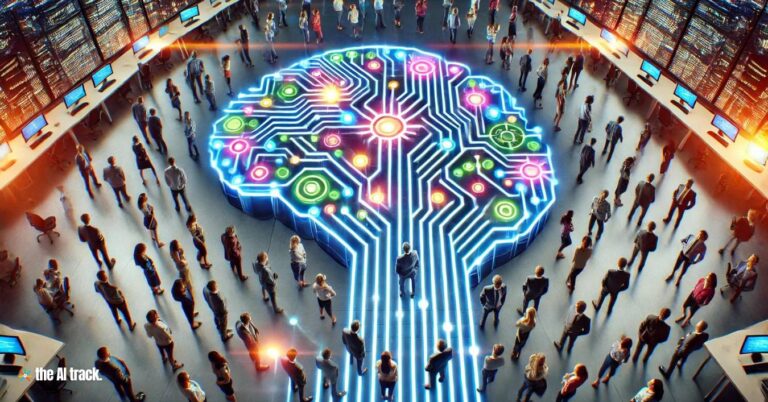Jump to Sections
From Automated Trading to Personalized Banking Experiences
AI in Finance has a transformative impact, primarily through the refinement of decision-making and analytical processes. By employing sophisticated algorithms and machine learning (ML), AI empowers financial institutions to automate various tasks, conduct thorough data analysis, and enhance overall operational efficiency. This article delves into the utilization of AI in the finance sector, particularly focusing on its effects on data analysis, investment strategies, and predictive modeling. This is very important to me.
AI in Finance and Banking: Personalized Services and Products

The integration of AI in finance and banking brings to the forefront the capability to offer services and products that are highly customized to individual needs. This level of personalization is primarily enabled by advancements in conversational AI and Natural Language Processing (NLP). These technologies are key in powering chatbots, which offer uninterrupted access to account information and are adept at interpreting and responding to customer queries in a manner that mimics natural, conversational human speech. This capability significantly eases the process for customers in accessing the information they need.
On the other hand, AI’s role in automating investment processes, like algorithmic trading and investment banking research, streamlines operations and potentially leads to better investment outcomes.
In the sphere of financial advice, the role of robo-advisors is particularly noteworthy. These AI-driven advisors utilize sophisticated algorithms to provide tailored investment advice, taking into account factors such as the individual’s financial goals, risk tolerance, and the current market conditions. By analyzing extensive datasets, robo-advisors can devise investment strategies that align with each client’s unique preferences and objectives, thereby facilitating more informed financial decision-making.

Moreover, the deployment of AI in finance must be characterized by transparency and understandability to build and maintain customer trust. It is imperative for AI-driven services, including robo-advisors and automated systems, to be transparent about their operational mechanisms and decision-making processes. This commitment to transparency not only bolsters user confidence but also adheres to the ethical standards required in AI applications within the financial sector. Providing clear insights into the functionalities and decisional criteria of these AI systems is essential in establishing their reliability and trustworthiness in the eyes of customers.
Finally, the globalization of AI in financial services requires careful localization to cater to diverse languages, cultures, and demographics. This involves adapting AI models to suit different global markets, ensuring cultural sensitivity and linguistic accuracy, thereby making AI in finance truly inclusive and globally applicable.
Risk Management and Fraud Detection

In the finance and banking industry, artificial intelligence is increasingly becoming a cornerstone for enhancing risk management and mitigating fraud. By harnessing data science and machine learning, AI systems are capable of sifting through patterns and trends to pinpoint and alert institutions to atypical activities, which is instrumental in thwarting cyberattacks and fraud. The real-time analysis of large volumes of data by AI algorithms empowers financial institutions to identify and respond to potential risks and threats with greater efficacy.
Enhanced Risk Management and Fraud Detection through AI
- AI-Enhanced Risk Management Solutions: Financial institutions are now integrating AI-based risk management solutions that scrutinize every transaction with remarkable accuracy. This detailed analysis aids in the early detection of potential risks and threats, thereby bolstering the overall security framework.
- AI in Fraud Detection and Prevention: In the realm of fraud prevention, AI is proving to be invaluable. It examines patterns in employee behavior, communications, and transactions to identify anomalies that may indicate misconduct. Furthermore, AI algorithms are employed to scrutinize email communications, detecting patterns that could suggest the theft of intellectual property.
- Sophisticated AI-Powered Fraud Risk Management: Utilizing AI and machine learning, fraud risk management systems perform real-time, advanced analysis of transactions. They are capable of highlighting risks and anomalies that might otherwise go unnoticed. These systems provide precise and predictive insights, enhancing the efficiency of fraud detection and prevention mechanisms.
- AI in Compliance and Risk Monitoring: AI technology is significantly improving the processes of risk and compliance monitoring, as well as reporting. The machine learning aspect of AI is particularly adept at identifying patterns and anomalies within large datasets, facilitating more prompt and accurate risk identification. This capability enables businesses to make swifter, more informed decisions, consequently reducing their risk exposure.
- Improved Loan and Credit Decision-Making: AI aids in making more accurate loan and credit decisions by analyzing a broader range of data, leading to better risk assessment and potentially lower default rates.
These instances underscore the pivotal role AI plays in addressing the challenges of risk management and fraud detection within the finance and banking sector. By offering solutions that are both more efficient and effective, AI is reshaping the way these industries combat fraudulent activities and enhance their risk identification and management strategies.
Automation and Efficiency

In the realm of finance and banking, automation spearheaded by artificial intelligence (AI) is a critical factor driving increased efficiency. AI’s role is instrumental in automating monotonous and labor-intensive tasks, which in turn allows financial institutions to process substantial amounts of data with greater speed and precision. This shift towards automation not only enhances operational efficiency but also diminishes the likelihood of manual errors in various functions such as data processing, analytics, document management, customer interactions, and other routine tasks.
The role of generative AI in automating operations extends beyond routine tasks, contributing to enhanced efficiency and innovation. It includes applications in software coding, hardware development, and data synthesis, transforming operational models and contributing to more effective and innovative solutions.

Enhancing Efficiency through AI-Powered Automation
One illustrative example of AI’s impact in automation is seen in document processing systems. These AI-powered systems are capable of autonomously extracting pertinent information from financial documents like invoices and receipts. Subsequently, this data is seamlessly integrated into the relevant systems. This automated process eliminates the necessity for manual data entry, thereby conserving time and significantly reducing the potential for human error.
The role of generative AI in automating operations extends beyond routine tasks, contributing to enhanced efficiency and innovation. It includes applications in software coding, hardware development, and data synthesis, transforming operational models and contributing to more effective and innovative solutions.
Transforming Customer Service
In the customer service domain, AI-enabled chatbots and virtual assistants are revolutionizing the experience in finance and banking. These tools, empowered by natural language processing (NLP) and machine learning, are adept at providing tailored assistance, addressing common queries, and guiding customers through various banking procedures. They can comprehend and respond to customer inquiries with accuracy and relevance.
These chatbots ensure that customer support is available 24/7, considerably enhancing the overall customer experience by minimizing wait times for assistance. Furthermore, their ability to simultaneously handle multiple customer inquiries ensures prompt and efficient service delivery.

Advancing Data Analytics and Forecasting
AI’s capabilities extend into the realm of data analytics and forecasting. AI algorithms can meticulously analyze extensive financial data sets, yielding insights for data analytics, performance assessment, predictions, and forecasting. By evaluating market trends and historical data, AI assists financial institutions in making well-informed decisions and in executing trades with a speed unattainable by human traders.
For instance, AI-driven trading systems have the capacity to scrutinize real-time market data, detect emerging patterns, and carry out trades based on pre-established algorithms. Their rapid response to market fluctuations translates into an enhanced trading performance, surpassing that of traditional human-operated systems.
In summary, AI’s incorporation into finance and banking is significantly elevating efficiency, transforming customer service, and refining data analytics and forecasting capabilities. Through automating routine tasks, providing round-the-clock customer assistance, and enabling faster, data-driven decision-making, AI is setting new standards in these industries.
Compliance and Transparency

In the finance and banking sectors, AI is increasingly becoming instrumental in ensuring regulatory compliance and promoting transparency. By meticulously analyzing data and vigilantly monitoring transactions, AI assists in pinpointing potential compliance issues, thus contributing to a more secure and stable financial environment. This capability of AI is particularly significant in identifying and addressing activities like money laundering and insider trading.
The application of AI in these domains facilitates the detection of suspicious activities, prompting timely alerts to compliance officers for further scrutiny. This proactive approach not only fortifies the integrity of financial operations but also aids in the prompt resolution of potential regulatory infringements.
Moreover, AI’s role extends to streamlining the regulatory reporting process. By automating the collection and analysis of data, AI significantly alleviates the workload of compliance teams. This automation translates into not only accuracy in reporting but also ensures compliance reports are prepared and submitted in a timely manner. By reducing human intervention in data handling, AI minimizes the risk of errors and enhances the overall efficiency of the compliance and reporting process.
Thus, the integration of AI in compliance and transparency tasks in finance and banking is not only enhancing the effectiveness of these processes but also ensuring a higher standard of regulatory adherence and operational transparency.
Generative AI’s Economic Impact in Banking

Generative AI is projected to be a game-changer, potentially augmenting the sector’s economic value by an astounding $200 billion to $340 billion annually. This seismic shift is expected to be most pronounced in specific segments such as risk and legal, corporate banking, and retail banking.
The impact of generative AI goes far beyond mere productivity improvements; it’s poised to revolutionize job roles and the nature of customer interactions. This paradigm shift holds the promise of not just enhancing existing business models but potentially giving rise to entirely new ones. The banking sector stands on the brink of a transformative era, propelled by the capabilities of generative AI.
Economic Impact on Corporations

In the corporate world, especially within the finance and technology sectors, the advent of generative AI is anticipated to have profound economic repercussions. Financial institutions and tech firms, in particular, are poised to witness considerable cost savings in their payroll expenses. Estimates suggest that 60 to 80 percent of their payrolls are allocated to roles likely to be impacted by AI integration. This technological shift is expected to catalyze substantial organizational transformations. Consequently, it presents these corporations with critical strategic decisions: should these payroll savings be reinvested to foster further innovation and growth, or should they be allocated towards other organizational objectives? This dilemma underscores the far-reaching implications of AI on corporate strategy and resource allocation.
Talent and Skill Development in AI

The effective implementation of Artificial Intelligence (AI) transcends technological prowess and delves into the human element of the workforce.
The intricate interplay of technology and human skill is pivotal, underscoring the necessity of upskilling and training in specialized areas such as prompt engineering and database curation. This dual focus on technology and talent development is critical for leveraging AI to its fullest potential.
Addressing the challenges related to talent, particularly in recruitment and training, emerges as a fundamental aspect for banks aiming to fully harness the capabilities of AI. Such a holistic approach ensures that technological advancements are complemented by a skilled and proficient workforce, capable of navigating and optimizing AI applications in the banking sector.
Need for Increased Training and Adaptation

The emergence of generative AI in the contemporary workplace underscores a critical need for enhanced training and adaptation among the workforce. Such training is imperative to adequately prepare employees for the increasingly significant role that AI is projected to assume across various industries, particularly those sectors that have hitherto experienced minimal technological disruption. To facilitate this transition, it is essential for both corporate entities and governmental bodies to allocate resources towards comprehensive training programs. These initiatives are vital in equipping workers with the necessary skills and knowledge to proficiently navigate and leverage these rapidly advancing technologies, ensuring a smooth integration of AI into the fabric of the modern workplace.
Potential challenges or limitations of using AI in finance and banking

The incorporation of AI in finance and banking, while offering numerous benefits, also presents several challenges and limitations that need careful consideration:
- Data Quality and Bias: The effectiveness of AI models hinges significantly on the quality and representativeness of the data used. Poor data quality can lead to inaccurate and biased outcomes. This is a critical issue, as biased AI models can result in unfair practices and decisions, affecting customers and market dynamics.
- Regulatory Compliance: The finance and banking sectors are tightly regulated. Ensuring that AI systems align with legal and ethical standards poses a considerable challenge. The dynamic nature of regulations requires AI systems to be adaptable and compliant with evolving legal frameworks, which can be a complex task.
- Cybersecurity Vulnerabilities: The deployment of AI in these sectors raises substantial cybersecurity concerns. AI systems, like any digital technology, are susceptible to cyberattacks, unauthorized access, and data theft. These risks can lead to serious security breaches, jeopardizing customer trust and financial stability.
- Ethical Implications: AI’s potential to introduce or perpetuate biases raises significant ethical concerns. There is a risk of AI algorithms inadvertently discriminating against certain groups or individuals, leading to ethical dilemmas and potential harm.
- High Costs and Ongoing Maintenance: The implementation and maintenance of AI systems require substantial financial investment. These costs include not only the initial development and deployment but also ongoing updates and maintenance to ensure the systems remain effective and secure.
- Data Security and Compliance Issues: Given the sensitivity of financial data, the use of AI in this sector poses unique challenges in terms of data security, compliance, and transparency. Ensuring the confidentiality and integrity of sensitive information while adhering to data protection regulations is paramount.
- Challenges in Scaling Generative AI: Scaling generative AI in banking is marked by distinct challenges, encompassing aspects such as model tuning, ensuring data quality, and harmonizing AI integration with pre-existing operational frameworks. To effectively scale up, a multifaceted strategy is essential. This approach should encompass strategic planning, adept management of talent, seamless integration of technology, and a restructuring of the operational model. Key to this process is the development of adaptable, scalable AI models that not only align with the overarching business objectives but are also designed to evolve in response to the dynamic nature of market demands and technological advancements. Such a comprehensive strategy ensures that the integration of generative AI into banking systems transcends mere implementation, evolving into a cornerstone of innovation and efficiency.
- Impact on High-Paying Jobs: The integration of AI, particularly generative AI, is likely to significantly affect white-collar workers in high-paying jobs such as business analysts, marketing managers, software developers, and others. These are roles traditionally considered secure from automation, but the advancement of AI technologies suggests a need for these professionals to adapt and upskill to remain relevant in the evolving job market.
Addressing these challenges is crucial for the responsible and effective use of AI in finance and banking. It involves striking a balance between leveraging the benefits of AI and mitigating the associated risks through careful planning, robust security measures, ethical considerations, and compliance with regulatory standards.
Conclusion

The incorporation of AI in finance and banking is indeed a game-changer, fundamentally altering various operational aspects of these industries. This technological advancement has streamlined numerous manual processes, significantly upgraded risk management protocols, and substantially enhanced customer engagement. Moreover, AI has facilitated a deeper and more nuanced understanding of financial market dynamics.
Key AI-powered technologies reshaping these sectors include:
- Chatbots: AI-driven chatbots are revolutionizing client interaction in finance and banking. These sophisticated systems offer personalized customer service, efficiently handling inquiries and guiding users through complex banking procedures. Their ability to provide round-the-clock assistance greatly improves the overall customer experience.
- Robo-Advisors: In the realm of investment, robo-advisors have emerged as a pivotal AI application. These systems utilize advanced algorithms to offer tailored investment advice, taking into account individual client goals, risk tolerance, and market conditions. This personalized approach to investment strategy is greatly enhancing the decision-making process for investors.
- Automated Trading Systems: The trading landscape is being transformed by AI-powered systems capable of analyzing real-time market data, identifying trends, and executing trades with a speed and precision unattainable by human traders. This has not only increased trading efficiency but also opened new opportunities for optimizing investment strategies.
The transition to AI-centric operations in finance and banking is not just a trend but a fundamental shift towards more efficient, precise, and customer-focused services. As these technologies continue to evolve, they promise to further refine and redefine the way financial institutions operate, offering unprecedented levels of efficiency and insight into the complex world of finance.
Key Takeaways
- AI refines decision-making and analytical processes in finance, utilizing algorithms and machine learning for automation and data analysis.
- Personalized banking services are enhanced through conversational AI and NLP, exemplified by advanced chatbots and robo-advisors for tailored financial advice.
- AI’s role in risk management and fraud detection is critical, offering sophisticated solutions for monitoring transactions and detecting irregularities.
- Generative AI is influencing the economic dynamics in banking, potentially impacting high-value jobs and requiring upskilling in the workforce.
- Despite its benefits, AI in finance faces challenges such as data quality and bias, regulatory compliance, cybersecurity risks, and ethical implications.
- The article concludes that AI is fundamentally transforming the finance and banking sectors, improving efficiency, customer service, and financial strategy development.
Sources
- Generative A.I.’s Biggest Impact Will Be in Banking and Tech, Report Says | The New York Times
- Capturing the full value of generative AI in banking | McKinsey
- AI for Finance Industry: Advantage and Disadvantage | Experlu
- The Top 5 Benefits of AI in Banking and Finance | TechTarget
- AI in Finance 2022: Applications & Benefits in Financial Services | Insider Intelligence
- The Four Key Challenges of AI in Financial Services | Appen






